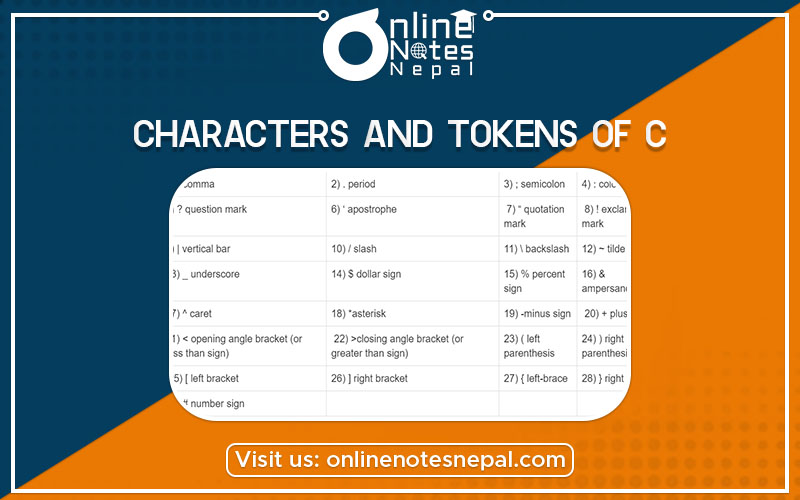Published by: Nuru
Published date: 21 Jun 2021

The set of characters that are used to form words, numbers, and expressions in C is called a character set of C. The combination of these characters forms words, numbers, and expressions. Characters and tokens of C are vital elements of C.
The C character set is grouped into the following four categories:
1) Letters or alphabets
2) Digits
3) Special Characters
4) White Spaces
All decimal digits: 0……9
| 1) , comma | 2) . period | 3) ; semicolon | 4) : colon |
| 5) ? question mark | 6) ‘ apostrophe | 7) “ quotation mark | 8) ! exclamation mark |
| 9) | vertical bar | 10) / slash | 11) \ backslash | 12) ~ tilde |
| 13) _ underscore | 14) $ dollar sign | 15) % percent sign | 16) & ampersand |
| 17) ^ caret | 18) *asterisk | 19) -minus sign | 20) + plussign |
| 21) < opening angle bracket (or less than sign) | 22) >closing angle bracket (or greater than sign) | 23) ( left parenthesis | 24) ) right parenthesis |
| 25) [ left bracket | 26) ] right bracket | 27) { left-brace | 28) } right brace |
| 29) # number sign |
1. Blank space
2. Horizontal tab
3. Carriage return
4. Newline
5. Form feed
1. In a passage of text, individual words and punctuation marks are called tokens. Similarly, in a C program, the smallest individual units are known as tokens of C.
2. The basic elements recognized by the C compiler are known as “C tokens”.
3. E.g. of C tokens are: keywords (e.g. float, while), identifiers (e.g. num, sum), constants (e.g. 15.5, 100), string literals (e.g. “ABC”, “year”), operators (e.g. +, ,*,/) and special symbols (e.g. [], {}, (), ,).
Every C word is classified as either a keyword or an identifier.
Keywords are predefined words in C programming language.
• All keywords have fixed meaning and these meanings cannot be changed.
• Keywords serve as basic building blocks for program statements.
• Keywords are also called reserved words because they are used for pre-defined purposes and cannot be used as identifiers.
There are generally 32 keywords:
| 1) auto | 2) break | 3) case | 4) char |
| 5) const | 6) continue | 7) default | 8) do |
| 9) double | 10) else | 11) enum | 12) extern |
| 13) float | 14) for | 15) goto | 16) if |
| 17) int | 18) long | 19) register | 20) return |
| 21) short | 22) signed | 23) sizeof | 24) static |
| 25) struct | 26) switch | 27) typedef | 28) union |
| 29) unsigned | 30) void | 31) volatile | 32) while |
note: keywords are written in lower case
• Every word used in the C program to refer to the names of variables, functions, arrays, pointers and symbolic constants are called identifiers.
• These are user-defined names and consist of a sequence of letters and digits, with a letter as the first character.
• Both uppercase and lowercase letters can be used, although lowercase letters are commonly preferred.
• The underscore character can also be used to link between two words in long identifiers.
1) The first character must be an alphabet (or underscore).
2) Must consist of only letters, digits, or underscore.
3) It must not contain white space. The only underscore is permitted.
4) Keywords cannot be used.
5) Only the first 31 characters are significant.
6) It is case sensitive, i.e. uppercase and lowercase letters are not interchangeable.